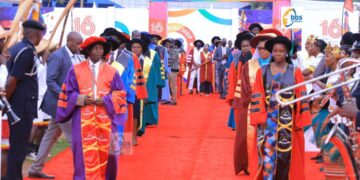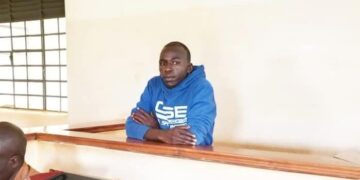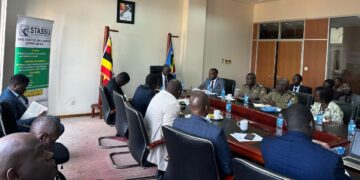By Gilbert Akampa Kakurugu
MBARARA,
Today during a health Media cafe sponsored by the Health Journalists Network Uganda in Mbarara Nuwagaba Allan Hadaad said he has always loved telling his story from the top after he tested HIV positive for the first time when he was only 11 years.
Hadaad told journalists that he didn’t know the source of his infection due to the fact that both his parents were HIV negative but the fact was, he was HIV positive and had to accept and live with it.
Hadaad had his grand mother who took care of him after being neglected by his biological mother.
“It was so hurting but I just had to bear the situation until when I grew up and raised my voice to say no to self Stigma and Discrimination hence fighting for the rights of my fellow Young People Living with HIV who were out there experiencing the same as I was” Hadaad narrates.
Haddad told journalists that a resilient person demonstrates the ability to bend, but not break, to stumble, but not stay down, a resilient person can not be shaken and that’s how he managed to grow up in an impoverished area of Uganda. Enduring malnutrition, being surrounded by cultural evils, and living in unimaginable conditions, his early years were far from easy.
Thriving in the community and focusing in school was not easy for him. He faced a lot of discrimination from the fellow students due to his HIV status. He found it hard because he was discriminated by the biological mother as well.
Hadaad had nothing to do with the stigma and discrimination which he experienced during his journey of growth apart from being strong.
Hadaad said he is now stigma free and ready to confront HIV in the society, break down stigma and discrimination chain within his community with the Aid of his past and this has helped the youth that have interacted with him and has also greatly helped the HIV adolescent clinic at TASO Mbarara to register success as they registered an increase in the number of suppressed HIV viral load in adolescents since 2021.
During the same training, Dr. Medard Arinaitwe an HIV specialist working with Mbarara regional referral hospital ISS clinic under the USAID systems strengthening activity under G to G program told journalists that they do their part in educating and treating HIV but as journalist we have a big role to pass on the message to people since we have a big following. He also noted that HIV and science evolve everyday.
Dr. Arinaitwe told journalists that there are four stages of HIV disease which include, Stage one that is characterized by asymptomatic and not categorized as AIDS, stage two which is characterized by minor skin manifestation and recurrent respiratory tract infections, stage three which is also characterized by unexplained weight loss ,chronic diarrhea longer than a month,prumonary tuberculosis and bacterial infections.
Dr. Arinaitwe also told journalists that there stage four where AIDS sets in and other opportunistic infections like Kaposis Sarcoma among others. He said that having a low viral load doesn’t mean someone has cured from HIV and cannot infect others.

Dr. Arinaitwe told journalists that the government has put in place some policies and they hope to achieve the 95-95-95 HIV target by 2030. These policies include, Target policy where they target key populations like commercial sex workers, test and treat policy, ending HIV stigma among others.
He said in terms of HIV control, Mbarara is doing well having prevalence 5.8% as of 2022 dropping from 9.6% in 2021 though still higher than the national prevalence of 5.5%.







































